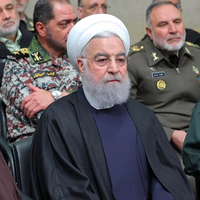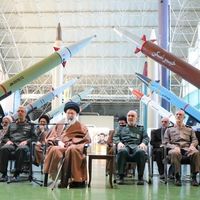Iran tortures detainee to extract confession on role in killing two judges
Iranian security forces are torturing a former political prisoner in a bid to extract a confession that he provided a gun used in the assassinations of two senior judges last month, a source familiar with the matter told Iran International.
Bijan Kazemi's home was raided by security agents in the western town of Kuhdasht in Lorestan province on Jan. 21, the source added, and all electronic devices belonging to him and his family were confiscated.
Kazemi was allowed to make a quick phone call to relatives.
“Kazemi was transferred from Kuhdasht to Ward 209 of Tehran's Evin Prison after his arrest. Intelligence Ministry agents beat him and are trying to extract a forced confession claiming that the shooter who killed Razini and Moghiseh obtained his weapon from him,” added the source, who requested anonymity for security reasons.
The two judges, Mohammad Moghiseh and Ali Razini were shot dead in Tehran on January 18 at the Supreme Court in central Tehran, in a rare attack on veteran top players in the theocracy. Supreme Leader Ali Khamenei led their funeral prayers.
According to Iranian media, the shooter, whose identity has not been revealed, took his own life as he was pursued by security forces.
Since the killings of Razini and Moghiseh, the Intelligence Ministry has arrested several former political prisoners allegedly in connection with the incident. No details have been released on those detainees.
Kazemi was previously imprisoned for two years after an arrest in 2020. He was allegedly affiliated with the formerly armed opposition group, Mojahedin-e Khalq, also known as MEK, according to the Iran Prison Atlas published by the California-based human rights organization United4Iran.
The two jurists, both clerics, had decades-long histories of handing down death sentences and lengthy prison terms to dissidents in numerous cases, and were nicknamed the “hanging judges” by critics.
Moghiseh and Razini were known for their roles in the 1988 mass executions of political prisoners.
During the targeted attack, one of the guards of the Supreme Court’s 39th Branch was also injured, but his identity has yet to be disclosed.
Islamic Republic officials have given conflicting reports over how the killings took place.
“A note left by the attacker indicates that the People’s Mojahedin Organization of Iran (MEK) instructed him,” said Jafar Ghadiani, the Disciplinary Prosecutor for Judges in a statement on January 26.
A newspaper in Iran published a report on January 19 saying only 13 seconds passed from the moment the shooter entered the office to the time he left, during which he fired six rounds in rapid succession.
The deaths of Moghiseh and Razini struck a nerve in Iran particularly among former political prisoners, many of whom described harsh punishments they meted out.







